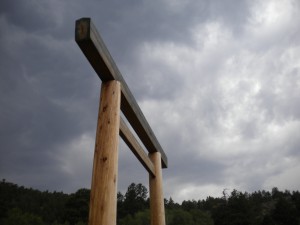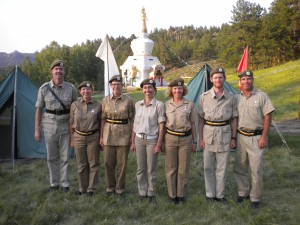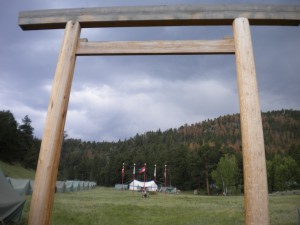Friday
Featured StoriesThe Accidental Kasung
 My Journey from Iraq to Magyal Pomra Encampment
My Journey from Iraq to Magyal Pomra Encampment
by Paul M. Kendel
Be a warrior without anger
~ Chogyam Trungpa Rinpoche
I awoke to the shock and reverberations of an explosion. It had been over a year since I had relived that night in Iraq where my infantry patrol was ambushed southwest of Baghdad. I was seconds from death, the IED tearing apart the front of my humvee; the cacophony of machine gun fire from the vehicles behind me shooting at an invisible enemy.
But I was not in Iraq; I was sleeping in my tent at the Dorje Kasung Encampment at Shambhala Mountain Center high up in the Rocky Mountains. Behind me the Great Stupa of Dharmakaya sat silently in the darkness; the sky was clear with the Milky Way brilliantly sparkling. The camp was fast asleep, with the guard at the large wooden Torii gate warming himself by the fire. The only sound were the banners of the four dignities jingling against their metal poles. It was the first night of Encampment and the once-empty green meadow was quickly morphing into a sacred mandala which would be our home for the next ten days. Fortunately the trauma of my sudden flashback would not reoccur and I would soon relax into the open space, the protection of the earth, and the support of those around me.
The Camp Commander greeted us with a “Welcome Home,” referring to the sacred space and the group of people around me. This greeting came from Chogyam Trungpa Rinpoche, or the Makkyi Rabjam, Dorje Dradul of Mukpo, his Kasung title, who described Encampment as a place where one belongs, where “you should feel a sense of making yourself at home in your duty.” For me, however, the words “Welcome Home” brought back unpleasant memories. When my infantry company returned from Iraq we were greeted at the airport with “Welcome Home,” by enthusiastic supporters of the war. We returned as heroes, but those people had no idea what kind of “war” we had waged, how we had irrevocably ruined numerous Iraqi lives, suffered the senseless deaths of fellow soldiers, our friends.
Enter the Magyal Pomra Encampment. I had my reservations of course. I had spent over twenty-four years in the Army and National Guard. Did I really want to sleep in a tent and march around all day? I just wasn’t sure I could handle members half my age – most of whom had never served in the military or fought in a war – giving me orders. But this was a neurosis, a manifestation of my own ego that needed to be overcome. James M. Gimian, student of Trungpa Rinpoche and a founding member of the Dorje Kasung, explains their role:
The container principle is widely used to describe the overall function of the Dorje Kasung. The container presents form and structure. It organizes the ground of any situation while allowing the content of that situation to manifest in various ways. . . While the proper container provides accommodation, that doesn’t necessarily mean comfort. An effective container can function like a pressure cooker, which employs a harsh environment to produce a gentle, processed outcome.
My sudden and unexpected flashback from Iraq, while occurring in a seemingly safe, tranquil, and accommodating environment, was a clear example of a “pressure cooker;” but by the end of Encampment it would produce a far gentler outcome. The Dorje Kasung are associated with the traditional linage protectors, the Mahakalas, who guard the teachings and wake up practitioners who have entered a confused state of mind, bringing them back to an open ground. As Gimian writes, “This reminder may manifest as a sudden start or jolt, almost like a fright that heightens one’s sharp sensory awareness of the immediate environment.” The Dorje Dradul understood that the physical mandala and the psychological mandala were one.
For those new to Encampment the first three days are considered “basic training.” Forced to wear an olive green cap, we were called “tortoises” in reference to both the cap’s design and the analogy that we were fresh to the Dorje Kasung and had yet to emerge from our shells. Standing on the parade field wearing my cap I thought to myself: Talk about an ego deflation. Two years ago I was a sergeant in the U.S. Army in charge of an infantry platoon training for combat in Afghanistan and now I’m a lowly “Tortoise,” wondering what the hell I’ve gotten myself into.
Ironically, the Camp Commander said that we would all soon graduate from “tortoise” to “tiger” and be given an olive green beret with a trident pin, the three blades representing the cutting of passion, aggression, and ignorance – as well as their motto. I thought about the title of my book, Walking the Tiger’s Path: A Soldier’s Spiritual Journey in Iraq, and laughed. I had worn berets before: as an Army paratrooper and infantryman.
 The most infamous part of Encampment, skirmish, was where I learned the true meaning behind the Dorje Kasung path. Divided into four groups or “social orders,” each group was placed in different locations within a beautiful valley on the opposite side of the mountain and provided with various types of supplies. Some had firewood, others extra food or water. The purpose was to see how each group or individual adapted to their situation.
The most infamous part of Encampment, skirmish, was where I learned the true meaning behind the Dorje Kasung path. Divided into four groups or “social orders,” each group was placed in different locations within a beautiful valley on the opposite side of the mountain and provided with various types of supplies. Some had firewood, others extra food or water. The purpose was to see how each group or individual adapted to their situation.
Multiple scenarios were available: groups could negotiate a trade for necessary items or they could attack and use aggression to take what was needed. Which social order would flourish and which would break down? Could those groups that did breakdown find a way to reconstitute themselves into something better? It all depended upon our ability to cooperate with the other groups, and most importantly, amongst ourselves.
I was placed in a group with a young woman as the leader. Relegated to a subservient role with little of my experience appreciated or used, I quickly allowed my ego to control my behavior and found myself walking off alone sulking atop a mountain outcrop and staring out across the valley into the seemingly endless woods beyond.
I reflected on the fact that I held an M.A. in the history of the Middle East and had traveled widely throughout the region. When I deployed to Iraq I had hoped to utilize my knowledge to assist the mission. Instead, senior members of my infantry company disregarded my experience, believing in their own innate superiority. My “liberal” political views and religious questioning led to alienation and mistrust. My leadership role was marginalized as a consequence, and now my habitual feelings of rejection and inadequacy began to engulf me. As reflective and tranquil as my respite from camp may have been, it was self-serving and detrimental not only to myself, but to the group; I had chosen to run away rather than stay and face my inner wounds.
But I was not alone in my neurosis. Drinking sake by the fire, our group began to unravel. Older members resented being told what to do, especially by someone years younger than them. We became angry and argumentative, trying to speak over each other every time someone opened their mouth, exposing our varied egos in all their glory – exactly what the Dorje Dradul would have wanted! I truly felt his presence, as if he was right there laughing at us all.
By the end of the skirmish it may have seemed that our group had failed, but we had accomplished something unique and valuable: a sense of awareness and understanding about ourselves, including the poisonous effects of ego. My purpose was not only to wake myself up and accept my own neurosis, but to “work with the neurosis of people who might interrupt the Great Eastern Sun vision or present obstacles to others on the path,” as the Dorje Dradul put it. It was also important to “promote a counteraction which could be physical or philosophical” if necessary.
 The Dorje Dradul’s vision of enlightened society offers truth – the wisdom of Shambhala; basic sanity in its purest form. At Encampment I entered the world of the Dorje Dradul, where nothing is what it seems. I arrived expecting to feel somewhat alienated because of my military experience, unsure if I would fit in. But unlike the painful and mixed experience following my return from Iraq, when I walked through the Torii gate on the way back from skirmish and into our Dorje Kasung mandala, it was truly a “Welcome Home.”
The Dorje Dradul’s vision of enlightened society offers truth – the wisdom of Shambhala; basic sanity in its purest form. At Encampment I entered the world of the Dorje Dradul, where nothing is what it seems. I arrived expecting to feel somewhat alienated because of my military experience, unsure if I would fit in. But unlike the painful and mixed experience following my return from Iraq, when I walked through the Torii gate on the way back from skirmish and into our Dorje Kasung mandala, it was truly a “Welcome Home.”
~~
To help support the author and purchase a signed copy of his book go to: www.walkingthetigerspath.com

















Sep 28, 2012
Reply
Kasung Kendel,
This is a truly beautiful article. Like your book, it opens the heart of warriorship in the midst of chaos and reveals kindness. Thank you for your magnificant contributions to our understanding of war and victory over war.
With warmest thoughts and aspiration for your well-being,
David Whitehorn, Rupon
Desung Council
Sep 28, 2012
Reply
I have hoped that you would write something about your experience of the US military and Dorje Kasungship, and I’m so glad to read this. Thank you! Please keep writing and sharing– this is crucial, quite helpful, and very well written.
Sep 28, 2012
Reply
Dear Paul, thanks for sharing this report — Funny how even “failure” holds a prize.